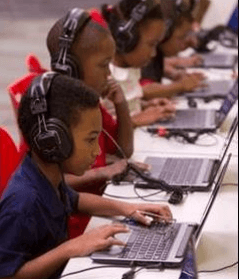Phalen Leadership Academies
Your Partner in Creating Great Schools
College and Career Readiness Central Theme at PLA

College and Career Readiness Driven by Great Learners and Personalized Learning
June 10, 2015 – Posted by Earl Martin Phalen
High School graduation season is upon us. During this time of year, countless numbers of students will being making the transition from high school to college and career paths. How to we ensure that this transition is successful? In the coming weeks, we will be featuring blog posts that explore best practices in making to ensure college and career readiness.
At the George and Veronica Phalen Leadership Academies (PLA) – named in honor of my parents – we believe that all children deserve to attend schools that help them acquire the academic skills and personal qualities they need to succeed in postsecondary education, and which prepare them to succeed in the careers of the 21st century. Over 63% of all jobs in the near future will require at least some college education (Carnevale, Smith, & Strohl, 2010); all jobs will require that young people have the confidence and determination needed to succeed.

At PLA, ensuring college and career readiness means ensuring that our scholars are proficient in all core academic subjects and prepared socially and emotionally to succeed, both in school and in life. We see the potential for the Indianapolis Public Schools (IPS) to become one of the nation’s first urban communities in which over 80% of our children achieve proficiency in math and reading; develop key social-emotional skills like grit, perseverance, and determination; graduate from high school; and pursue a postsecondary degree or career.
In that effort, PLA has been blessed to receive the support of many local and national partners such as The Mind Trust, the Charter School Growth Fund, and the Glick Family Foundation to build a nonprofit network of public charter schools that are beautiful, warm, and inviting for scholars to learn and grow in. Our first school opened in the fall of 2013 and currently serves students in grades K-3, with a new grade to be added each year up to grades K-8. Ninety-eight percent of our scholars are African American, and 93% are eligible for Free and Reduced Price Lunch. Ultimately, we have been approved to operate 10 schools and serve nearly 10,000 children annually.
Almost no American institution has remained unchanged over the past hundred years; the one institution that looks nearly identical, however, is primary and secondary education. In over 20 years of working to raise student achievement, I have become convinced that our schools and our classrooms must change in order to adequately prepare all children for college and careers, regardless of ZIP code, demographics or family economics. Our schools are not delivering on this promise for far too many of our children. Across the state the dropout rate for black students in 2014 was 9.7% (Indiana Department http://amgrad.wfyi.org/blogs/wfyi-blog/2015/06/10/college-and-career-readiness-driven-by-greatlearners-and-personalized-learning/ of Education, 2015). When you consider that 1 in 8 white males aged 20-34 without a high school diploma or GED are in prison – 1 in 3 for black males – it is clear the futures of young people are now gravely at risk (The Pew Charitable Trusts, 2010).
I used to believe that there were two primary levers to providing such an education: people (great teachers, engaged parents, strong school leadership, and involved community members) and expanded learning time (preschool, extended school days and years, tutoring, high quality summer learning programs). I’ve now come to appreciate the importance of a third lever: technology. Technology cannot replace great teachers, but used appropriately it can complement exceptional teachers, effectively reduce class size, maximize learning time, and enable children to own their education.
With these principles in mind, the PLA approach to college and career readiness is one that relies on highly personalized and customized instruction. Every classroom includes a strong teacher and teacher’s assistant (TA). While the average class size is 24 scholars, most children spend their instructional time in groups of eight students rotating through three learning blocks; one session with the teacher, one with the TA, and one session working with personal computers that tailor instruction to each child’s skill level. This allows children to build and grow at their own pace and allows teachers to reteach concepts and ensure that truly no child is left behind. It also provides more time for individualized attention for each child, allowing a teacher to better serve as a scholar’s guide and mentor.
We also believe that it is critical to build and then sustain scholars’ academic proficiency from an early age to ensure that children remain on track for graduation, college, and careers. Third grade, for example, marks a critical milestone when children should transition from learning to read to reading to learn. If children are not reading proficiently by third grade, it becomes increasingly challenging for them to continue learning at grade level. To this end, our approach is working; 93% of our scholars recently passed the IREAD-3, the state standardized exam that is the main tool used to measure third grade reading proficiency in Indiana.
While I acknowledge that there is still much work to be done towards ensuring that each Indiana student is able to acquire the knowledge and skills necessary for the careers of today and tomorrow, at PLA we will continue to strive towards ensuring that all of our children can fulfill their tremendous innate potential.
What are your thoughts on the Phalen Leadership Academies model? Do you have a personal story of someone who has benefited from this strategy? Share your thoughts in the comments below, and on social media using #AmGradIndy.

Earl Martin Phalen is the Founder of Summer Advantage and Phalen Leadership Academies. He received the Black Entertainment Television National Hero Award and the President's Service Award from Bill Clinton. He graduated from Yale and Harvard Law School. His work has been featured in MSNBC and TIME magazine.

